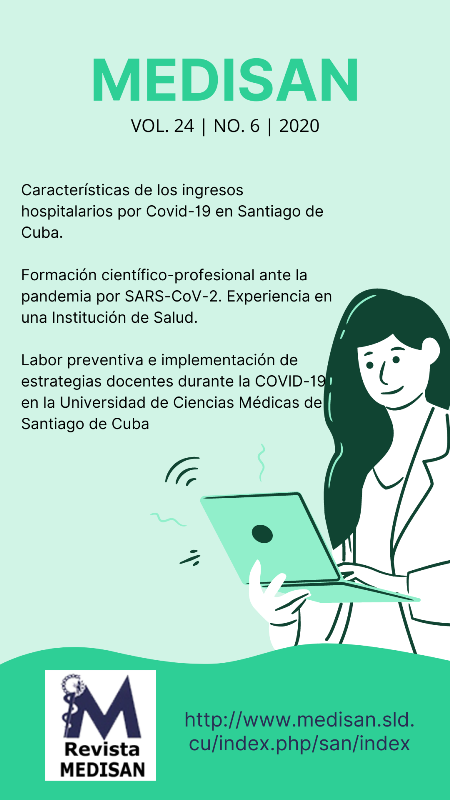Teaching, scientific and academic training of consultant professors from the Stomatology Faculty in Santiago de Cuba
Keywords:
odontology teaching staff, teaching category, scientific degree, consultant professor.Abstract
Introduction: The professor, teaching staff or teacher is the one professionally devoted to teaching and, also, to the transmission of behavior values, techniques and knowledge; that facilitates learning so that the student reaches it in the best possible way.
Objective: To describe the fundamental characteristics of consultant professors functions and work.
Methods: A descriptive study was carried out in Mártires del Moncada Teaching Provincial Stomatologic Clinic in Santiago de Cuba, during December, 2018, which universe was formed by the 29 consultant professors, associated to the Stomatology Faculty until that year. The age, sex, specialty, teaching category and granting year were considered as variables of interest, as well as the academic and scientific degrees.
Results: The years with more assignment of associate or instructor professors were 1998 and 2009, respectively. In general, most of the teaching staff corresponded to the 65-70 age group and the female sex, as long as instructor professor category constituted the 82.8 % and associate professor 17.2 %. As for the academic degree, the highest number of associate and instructor professors was second degree specialists, very few of the associate professors had studied masters degrees and none of the instructor professors had applied for the doctorate.
Conclusions: The special condition of consultant professor represents and still is a recognition to the academic work showed in the consultancy of the teaching, assistance and investigative tasks during the professional life.
Downloads
References
2. Salas Perea R, Salas Mainegra A. La educación médica cubana. Su estado actual. Revista de Docencia Universitaria. REDU. 2012 [citado 20/06/2020];10(Número especial):293-326.
3. Domínguez Lobaina J, Fresno Chávez C. Virtualmend: un sistema gestor de contenidos de aprendizaje para la universalización de la educación superior. ACIMED. 2007 [citado 20/06/2020];15(1). Disponible en: http://scielo.sld.cu/scielo.php?script=sci_arttext&pid=S1024-94352007000100012&lng=es&nrm=iso&tlng=es
4. Fuguet Boullón JR, Betancourt García AI, Ochoa Jiménez L, Martínez Alfonso FE, Barrios Pedraza T, Viera Rodríguez D. Dr. Bernardo Canto Vidal: una vida consagrada a la Estomatología y al sagrado sacerdocio de enseñar. Rev Med Electron. 2015 [citado 20/06/2020];37(2). Disponible en http://scielo.sld.cu/scielo.php?script=sci_arttext&pid=S1684-18242015000200009
5. Pérez Caballero MD. Formación de valores en los profesionales de la Salud. Rev Cubana Med. 2015 [citado 20/06/2020];54(4):278-9. Disponible en: http://scielo.sld.cu/scielo.php?script=sci_arttext&pid=S0034-75232015000400001
6. ECURED [Internet]. La Habana: Colaboradores de EcuRed; 2019. Profesor [citado 20/06/2020]. Disponible en: https://www.ecured.cu/index.php?title=EcuRed&oldid=3580011
7. Agencia Cubana de Noticia (ACN) [Internet]. La Habana: ACN; c2019. Armas Padrino I. Profesores Consultantes profundizarán sobre Educación en el trabajo. Diario Digital de la Isla de la Juventud "Victoria" [citado 20/06/2020]. Disponible en: http://www.acn.cu/salud/51225-profesores-consultantes-profundizaran-sobre-educacion-en-el-trabajo
8. Universidad Virtual de Salud. Cátedra de la Facultad de Ciencias Médicas "Manuel Fajardo" (UVS) [Internet]. Comunidad de Profesores Consultantes Facultad Fajardo. La Habana: Universidad de Ciencias Médicas; 2014 [citado 20/06/2020]. Disponible en: http://uvsfajardo.sld.cu/comunidad-de-profesores-consultantes-facultad-fajardo
9. Dueñas Becerra J, García Penedo H. Dinámica psicológica del adicto. Basada en el ideario de José Martí. La Habana: Editorial Científico-Técnica. Revista del Hospital Psiquiátrico de La Habana. 2016 [citado 20/06/2020];13(2). Disponible en: http://www.revistahph.sld.cu/2016/Nro%202/critica%20de%20libro.html
10. Castañeda Guillot C. La historia y los nuevos retos de la Gastroenterología Pediátrica en Cuba. Rev Cubana Pediatr. 2018 [citado 20/06/2020];90(2). Disponible en: http://www.revpediatria.sld.cu/index.php/ped/article/view/498/200
11. Cuba. Ministerio de Educación Superior. Resolución Ministerial No. 138/19. La Habana: MES; 2019 [citado 20/06/2020]. Disponible en: https://www.mes.gob.cu/es/resoluciones
12. Cuba. Ministerio de Educación Superior. Resolución Ministerial No. 139/19. La Habana: MES; 2019 [citado 20/06/2020]. Disponible en: https://www.mes.gob.cu/es/resoluciones
13. Cuba. Ministerio de Educación Superior. Resolución Ministerial No. 140/19. La Habana: MES; 2019 [citado 20/06/2020]. Disponible en: https://www.mes.gob.cu/es/resoluciones
14. Cuba. Ministerio de Educación Superior. Resolución Ministerial No. 153 del año 1994. Condición de Profesor Consultante en el Sistema de Educación Superior. La Habana: MES; 2019 [citado 20/06/2020]. Disponible en: https://www.mes.gob.cu/es/resolucione
15. Cuba. Ministerio de Salud Pública. Viceministerio Docencia e Investigaciones refiere las bases fundamentales para la organización del trabajo de los profesores consultantes en el sistema de salud. Resolución Ministerial No. 143/1996. La Habana: MINSAP; 1998.
16. Vignau Sánchez BS. La universalización de la educación superior en Cuba: una oportunidad para reflexionar sobre los modelos de gestión en las bibliotecas universitarias. ACIMED. 2004 [citado 20/06/2020];12(2). Disponible en: http://scielo.sld.cu/scielo.php?script=sci_arttext&pid=S1024-94352004000200013&lng=es&nrm=iso&tlng=es
17. Cuba. Ministerio de Educación Superior. Resolución Ministerial No. 85 del 2016. Reglamento para la Aplicación de las Categorías Docentes de la Educación Superior. La Habana: MES; 2019 [citado 20/06/2020]. Disponible en: https://www.mes.gob.cu/sites/default/files/documentos/85-2016.pdf
18. Alonso Pardo ME, Vidal Ledo M. Consideraciones acerca de los profesores consultantes en los centros de educación médica superior. Educ Med Super. 2009 [citado 20/06/2020];23(1). Disponible en: http://scielo.sld.cu/scielo.php?script=sci_arttext&pid=S0864-21412009000100010&lng=es&nrm=iso
Published
How to Cite
Issue
Section
License
All the articles can be downloaded or read for free. The journal does not charge any amount of money to the authors for the reception, edition or the publication of the articles, making the whole process completely free. Medisan has no embargo period and it is published under the license of Creative Commons, International Non Commercial Recognition 4.0, which authorizes the copy, reproduction and the total or partial distribution of the articles in any format or platform, with the conditions of citing the source of information and not to be used for profitable purposes.





